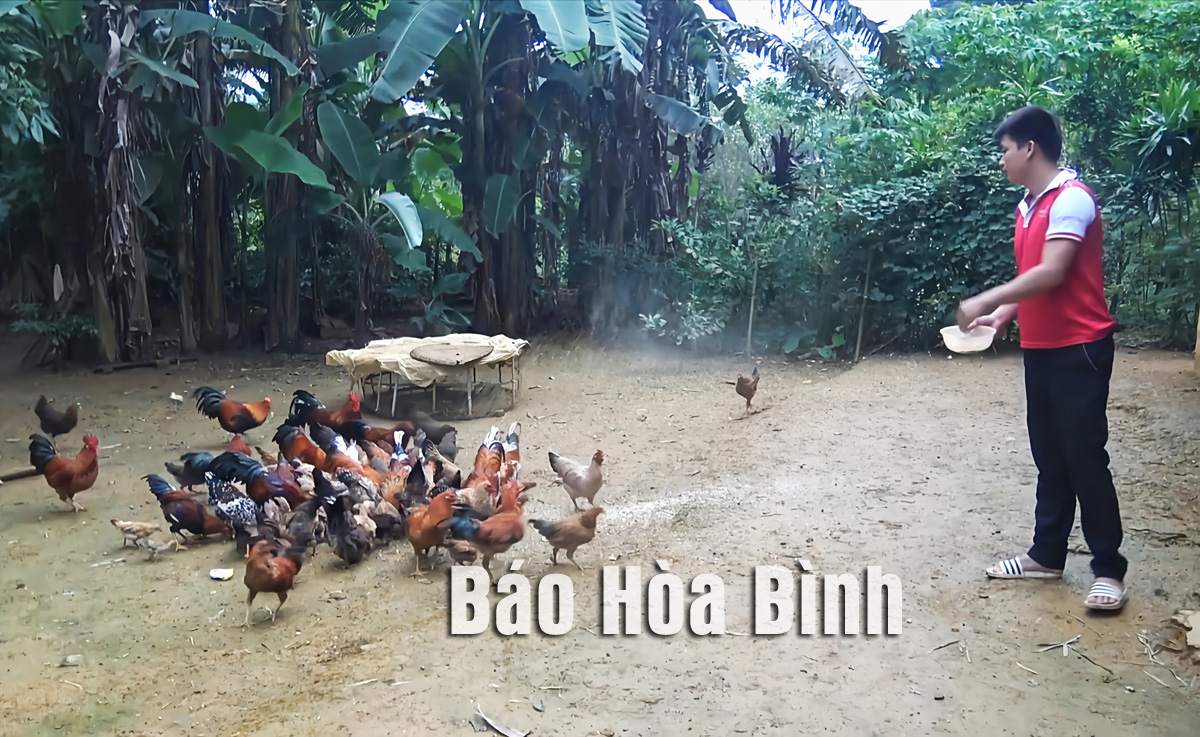
(HBO) - In recent years, many households in the province have invested in raising free-range local chickens (indigenous Ri chicken) in gardens and hills. With delicious quality, this is a type of poultry that enjoys high market price and good economic efficiency with stable output.

With favourable conditions for breeding and stable output, free-range local chicken farming is being multiplied in many communes in Lac Son district.
Due to the impact of the COVID-19 pandemic, in recent years, chicken breeding in the province has faced many difficulties. The pandemic, which caused a disruption in the supply chains, along with the high price of animal feed forced many households to switch to other jobs.
Huong Nhuong commune in Lac Son district is an example. Before the outbreak of the COVID-19 pandemic, raising chickens brought about stable income for many households. However, few of them engage in the business at present
The family of Quach Thi Hoa, who lives at Bung Coi hamlet, is one of the households that have been breeding chickens for many years.
According to Hoa, farmers are now facing difficulties as animal feed prices are still very high. For raising hybrid chickens, the possibility of running losses is high if they do not know how to take care of them. However, she said that it still bring out a profit.
Recently, her family sold 1,500 chickens at a price of 130,000 VND (5.5 USD) per kg, earning a profit of 30,000 VND per head, Hoa said, adding that she is breeding 800 chickens.
In Quyet Thang commune (Lac Son district), raising free-range chickens in gardens and hills has been maintained by many people, bringing high economic efficiency. Currently, the model of raising chickens on the hill has been multiplied in all hamlets in the commune. Bui Van Hoa's family is an example. After many years of struggling with pig farming, his family has switched to raising chickens. Now they earn over 200 million VND a year thanks to breeding chickens on one ha of acacia cultivation.
"As the price of animal feed is high at the moment, we will run a loss if breeding hybrid chicken,” Hoa said.
For local chicken, farmers will feed them with commercial animal food in about two months and then switch to corn and unhusked rice, thus, their meat is delicious. The chicken price is quite stable, ranging from 110,000-130,000 VND per kg. It may be up to 160,000-170,000 VND sometimes, so breeders will gain a profit.
Raising free-range local chicken is becoming popular not only in Lac Son district, but also in many localities in the province, including some communes of Tan Lac district.
According to the Sub-Department of Livestock and Veterinary Medicine, currently, the total poultry herd in the province is more than 8.8 million. The price of free-range local chickens ranges from 110 to 120,000 VND per kg on average. The price of Lac Thuy chicken is about 80,000-90,000 VND per kg while that of battery chicken is about 35,000-40,000 VND per kg. With the advantage of vast areas of hills and gardens as well as a big consumption market, breeding chickens is a promising industry./.
According to data from the Hoa Binh Provincial Party Committee, the industrial production index for the first six months of 2025 is estimated to have increased by 20% compared to the same period last year. This marks the highest year-on-year growth rate for this period since 2020.
In the first six months of 2025, Hoa Binh province’s export turnover was estimated at 1.145 billion USD, marking an 18.11% increase compared to the same period in 2024. Import turnover was estimated at $ 804 million, a 17.15% increase, which helped the province maintain a positive trade balance.
The lives of the ethnic minority farmers in Tan Lac district have gradually improved thanks to the new directions in agricultural production. This is a testament to the collective strength fostered through the professional associations and groups implemented by various levels of the district’s Farmers’ Union.
With the motto the "product quality comes first,” after nearly one year of establishment and operation, Muong village’s Clean Food Agricultural and Commercial Cooperative, located in Cau Hamlet, Hung Son Commune (Kim Boi district), has launched reputable, high-quality agricultural products to the market that are well-received by consumers. The products such as Muong village’s pork sausage, salt-cured chicken, and salt-cured pork hocks have gradually carved out a place in the market and they are on the path to obtaining the OCOP certification.
In the past, the phrase "bumper harvest, rock-bottom prices" was a familiar refrain for Vietnamese farmers engaged in fragmented, small-scale agriculture. But today, a new spirit is emerging across rural areas of Hoa Binh province - one of collaboration, organisation, and collective economic models that provide a stable foundation for production.
Maintaining growing area codes and packing facility codes in accordance with regulations is a mandatory requirement for agricultural products to be eligible for export. Recently, the Department of Agriculture and Environment of Hoa Binh province has intensified technical supervision of designated farming areas and packing facilities to safeguard the "green passport" that enables its products to access international markets.



